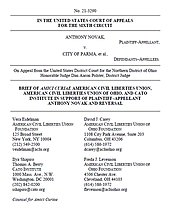The Facebook page was only online for twelve hours, but on the basis of nothing more than Novak’s Facebook posts, the Parma Police obtained warrants to arrest Novak and search his apartment. Novak was charged under a statute criminalizing disrupting police operations, even though the only effect that Novak’s Facebook page had on the police department consisted of a few citizens’ phone calls to the police station that took up a total of twelve minutes of their time.
The case went to trial and a jury acquitted Novak. Novak then sued the city and police for retaliating against First Amendment protected speech. After an appeal and remand on preliminary issues, the district court dismissed Novak’s case, holding that the police had probable cause to arrest him even if his Facebook parody was protected speech under the First Amendment.
Novak has again appealed to the Sixth Circuit, and Cato has joined the American Civil Liberties Union and ACLU Ohio on a brief supporting Novak. In the brief, we explain that the First Amendment protects Americans’ right to criticize their government, and that includes not only sober and straightforward speech but also mockery, satire, and parody. The government officials who are the targets of this speech are not always pleased, but the First Amendment protects speakers against government retaliation. If police could arrest citizens based on nothing more than their constitutionally protected expression, the First Amendment’s protections would be severely undermined.
Because parody and criticism of police officers had already been held to be protected speech well before Novak’s arrest, it should have been clear to any reasonable officer that Novak’s parody page could not establish probable cause for his arrest. We urge the Sixth Circuit to reverse the district court and make clear that citizens have a right to mock and parody the government without fear of retaliation.




